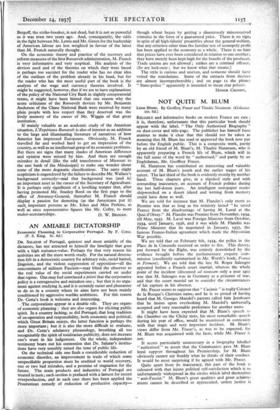AN AMIABLE DICTATORSHIP
Economic Planning in Corporative Portugal. By F. Cotta. (P. S. King. 8s. 6d.) Economic Planning in Corporative Portugal. By F. Cotta. (P. S. King. 8s. 6d.)
DR. SALAZAR of Portugal, quietest and most amiable of the dictators, has not attracted to himself the limelight that goes with a high nuisance-value. Perhaps for that very reason his activities are all the more worth study. For the natural detesta- tion felt in a democratic country for arbitrary rule, racial hatred, Jingoism, and the violent suppression of opposition—all the concomitants of militant Fascism—may blind the observer to the real value of the social experiments carried on under that regime. Onemay feel convinced a priori that the corporative policy is a retrogressive and mistaken one ; but that is no argu- ment against studying it, and it is certainly easier and pleasanter to do so in a country where its aims have not been mainly conditioned by aggressive warlike ambitions. For this reason Dr. Cotta's book is welcome and interesting.
The corporations appear in a double role. They are organs of economic planning : they are also organs for eliciting public spirit. In a country lacking, as did Portugal, that long tradition of co-operation and responsibility, both economic and political, which Great Britain enjoys, the latter function is perhaps the more important; but it is also the more difficult to evaluate, and Dr. Cotta's adulatory phraseology, breathing all too recognisably the spirit of totalitarian publicity, does not increase one's trust in his judgement. On the whole, independent testimony bears out his contention that Dr. Sala7ar's institu- tions have very sensibly raised the tone of public life.
On the technical side one finds a considerable reduction of economic disorder, an improvement in trade of which some unspecifiable proportion must be credited to world recovery, one or two bad mistakes, and a promise of stagnation for the future. The main products and industries of Portugal are treated in turn; each section is prefaced with a lament for recent overproduction, and in each case there has been applied the Procrustean remedy of reduction of productive capacity—
though wheat began by getting a disastrously misconceived stimulus in the form of a guaranteed price. There is no sign, in spite of all high-falutin' preambles about the general welfare, that any criterion other than the familiar test of monopoly profit has been applied to the economy as a whole. There is no hint that prices have ever been considered in relation to one another ; they have merely been kept high for the benefit of the producer. Trade unions are not allowed ; strikes are a criminal offence. (So are lock-outs ; but we know what that means.)
The style is curious and uneven, and someone should have vetted the translations. Some of the extracts from decrees are almost incomprehensible ; and on page t t the phrase " State-police " apparently is intended to mean etat policier.
HONOR CROomti.


































 Previous page
Previous page